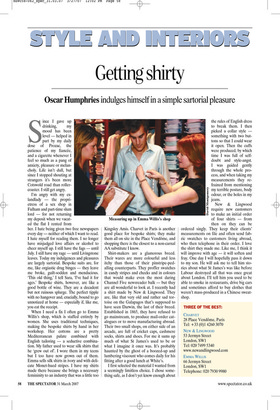Getting shirty
Oscar Humphries indulges himself in a simple sartorial pleasure Since I gave up drinking, my mood has been level — helped in part by my daily dose of Prozac, the patience of my fiancée, and a cigarette whenever I feel so much as a pang of anxiety, pleasure or melancholy. Life isn’t dull, but since I stopped shouting at strangers it’s been more Cotswold road than rollercoaster. I still get angry.
I’m angry with my exlandlady — the proprietress of a sex shop in Fulham and part-time slum lord — for not returning my deposit when we vacated the flat I rented from her. I hate being given two free newspapers every day — neither of which I want to read. I hate myself for reading them. I no longer have misjudged love affairs or alcohol to cheer myself up. I still have the fags — until July. I still have my rage — until Livingstone leaves. Today my indulgences and pleasures are largely sartorial. Bespoke suits are, for me, like orgiastic drug binges — they leave me broke, guilt-sodden and mendacious. ‘This old thing,’ I tell Sara, ‘I’ve had it for ages.’ Bespoke shirts, however, are like a good bottle of wine. They are a decadent but not ruinous splurge. The perfect tipple with no hangover and, crucially, bound to go unnoticed at home — especially if, like me, you eat the receipt.
When I need a fix I often go to Emma Willis’s shop, which is staffed entirely by women. She uses traditional techniques, making the bespoke shirts by hand in her workshop. Her cottons are a pretty Mediterranean palate combined with English tailoring — a seductive combination. My father used to wear silk shirts that he ‘grew out of’. I wore them in my teens but I too have now grown out of them. Emma sells silk shirts in ivory and with delicate Monet-hued stripes. I have my shirts made there because she brings a necessary femininity to an industry that was a little too Kingsley Amis. Charvet in Paris is another good place for bespoke shirts; they make them all on site in the Place Vendôme, and shopping there is the closest to a non-carnal AA substitute I know.
Shirt-makers are a glamorous breed. Their wares are more colourful and less itchy than those of their pinstripe-pedalling counterparts. They proffer swatches in candy stripes and checks and in colours that would make even the most daring Channel Five newsreader balk — but they are all wonderful to look at. I recently had a shirt made by New & Lingwood. They are, like that very old and rather sad tortoise on the Galapagos that’s supposed to have seen Darwin, the last of their breed. Established in 1865, they have refused to go mainstream, to produce mail-order catalogues or to move manufacturing abroad. Their two small shops, on either side of an arcade, are full of cricket caps, cashmere socks, shirts and shoes. For me it sums up much of what St James’s used to be or what I imagine it once was. It’s probably haunted by the ghost of a boozed-up and lumbering viscount who comes daily for his fitting after a good lunch at White’s.
I first selected the material I wanted from a seemingly limitless choice. I chose something safe, as I don’t yet know enough about the rules of English dress to break them. I then picked a collar style something with two buttons so that I could wear it open. Then the cuffs were produced, by which time I was full of selfdoubt and style-angst. I was guided gently through the whole process, and when taking my measurements they refrained from mentioning my terrible posture, body odour, or the holes in my jeans.
New & Lingwood require new customers to make an initial order of four shirts — from then on they can be ordered singly. They keep their clients’ measurements on file and often send fabric swatches to customers living abroad, who then telephone in their order. I love the shirt they made me. Like me, I think it will improve with age — it will soften and fray. One day I will hopefully pass it down to my son. He will ask me to tell him stories about what St James’s was like before Labour destroyed all that was once great about London. I’ll tell him you used to be able to smoke in restaurants, drive big cars and sometimes afford to buy clothes that weren’t mass-produced in a Chinese sweatshop.










































































 Previous page
Previous page